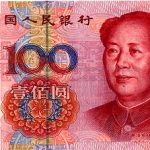 Global monetary order is evolving as the Chinese Renminbi has recently entered the IMF’s Special Drawing Rights (SDR’s) basket of top-tier currencies which determines currencies that countries will receive as part of IMF loans. The Renminbi has joined the elite club of currencies along with the U.S. Dollar, Euro, British Pound, and the Japanese Yen. It’s a seminal moment and fits in nicely with China’s de-dollarization strategy. The U.S. Dollar’s status as the world’s reserve currency won’t diminish any time soon but expect a gradual shift away from the $USD. Currently, if a country needs oil, soya beans or gold, for example, it must ensure that adequate $USD’s are in reserve to execute the trade. Being the dominant reserve currency ensures perpetual demand for the dollar as countries and businesses worldwide must continually purchase enough dollars to carry out foreign transactions.
Global monetary order is evolving as the Chinese Renminbi has recently entered the IMF’s Special Drawing Rights (SDR’s) basket of top-tier currencies which determines currencies that countries will receive as part of IMF loans. The Renminbi has joined the elite club of currencies along with the U.S. Dollar, Euro, British Pound, and the Japanese Yen. It’s a seminal moment and fits in nicely with China’s de-dollarization strategy. The U.S. Dollar’s status as the world’s reserve currency won’t diminish any time soon but expect a gradual shift away from the $USD. Currently, if a country needs oil, soya beans or gold, for example, it must ensure that adequate $USD’s are in reserve to execute the trade. Being the dominant reserve currency ensures perpetual demand for the dollar as countries and businesses worldwide must continually purchase enough dollars to carry out foreign transactions.
Both Russia and China share mutual interests in lowering the U.S. Dollar’s kingpin status and are engaging in bilateral trade that omits the $USD in transactions. According to the IMF, the Chinese economy has passed the U.S. economy based on purchasing power. China has been the largest exporter in the world since 2009 and passed the U.S. as the largest trading nation as measured by the sum of its exports and imports in 2014. China will make a dent in the $U.S. Dollar’s market share in the reserve currency system as inevitably some of the $U.S. market share will head east.
The second-biggest stock market in the world, it is a market value worth around $6 Trillion, is not yet included in global benchmark indexes. Chinese stocks makeup 10% of the world’s stock market value but are not part of the MSCI Emerging Markets index. MSCI is the most prominent provider of benchmark indexes worldwide. In June of this year, MSCI delayed including China A-Shares in its indices. This is the third year in succession that China’s domestic market (A-shares) were denied entry to International stock benchmarks. MSCI cited concerns regarding investor’s ability to move funds in and out of China after last year’s debacle where investors suffered a suspension in trading which left many A-Shares fund managers trapped in suspended stocks as investors demanded their money back.
We prefer to gain exposure to the largest Chinese companies trading in Hong Kong and we positioned ourselves accordingly on 9 August via the iShares China Large-Cap Fund (NYSE: FXI) and the offering includes exposure to 50 of the largest Chinese stocks that trade in Hong Kong in a single fund. The average market value of these blue-chip stocks in FXI is an astounding USD $86 Billion and includes mammoths such as Tencent Holdings Ltd, China Construction Bank, China Mobile (800 million subscribers) and the Bank of China. It has risen 4.38% since purchase. Interestingly, FXI rose by 279% during China’s 2005-2007 bull market and valuations are similar to the financial crisis bottom. Following is a link to our portfolio: portfolio-10-25-2016